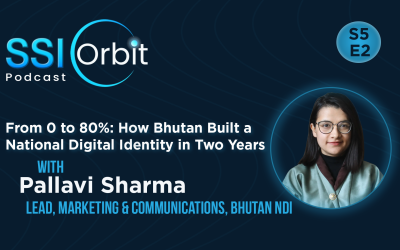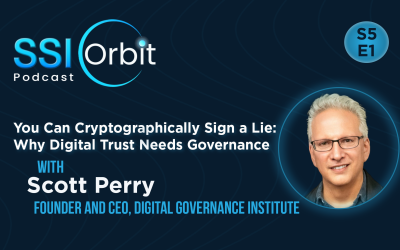>>> Listen to this Episode On Spotify
>>> Listen to this Episode On Apple Podcasts
Can Digital Notarization Solve Digital ID’s Chicken-and-egg Problem?

Which came first, the chicken or the egg?
Unlike a traditional, linear startup, a platform doesn’t need to acquire just one group of customers. At a minimum it needs two, its consumers and its producers.
But new platforms don’t initially create enough value to attract new users. It’s not economical for consumers to join the platform when there are no producers, and vice versa. This is called the chicken-and-egg problem.
This same problem exists in digital identity. Just switch out producers for issuers, consumers for verifiers, and platforms for ecosystems. And we have ourselves a chicken-and-egg problem.
The business value of credential exchange happens at verifications (e.g., lowered costs, lowered risk/fraud, lowered friction). And for this business value to be created, more credentials are needed in holders’ wallets.
Does the digital ID chicken-and-egg problem get solved by governments issuing ID credentials to their citizens? Must we wait on governments to become issuers to solve it?
What if organizations that currently conduct examinations (e.g., a financial institution does KYC during account opening) can extend their processes into the issuance of credentials?
Or what if digital trust providers (e.g., document authentication) extend their offering into the issuance of machine readable credentials?
Do issuers need to have access to source data (and uniqueness) to become attesters?
In the physical world, notaries exist to attest to the validity of documents. And this practice is very much trusted by verifiers.
Can Digital Notarization solve Digital ID’s chicken-and-egg problem?
About Podcast Episode
Some of the key topics covered during this episode with Dan are:
- How does the Chicken-and-egg Problem relate to digital identity?
- Is there a dependency on Government IDs to seed the marketplace?
- Are unique identifier databases required to become a credential issuer?
- What is Transitive Trust? And how does it differ from how trust gets established otherwise (e.g., through backend API calls)?
- The missing role in the trust triangle: The Examiner.
- Can Examiners become Digital Notaries?
- Rethinking Authentication and Authorization – using attestations from multiple issuers helps to create more trust.
- How issuance can become a business model for many trusted service providers.
- Some Challenges with the mDL (ISO/IEC 18013) Standard.
- The benefits of using a Microcredential approach in Issuance.
- Misconceptions about becoming credential issuers (e.g., assuming liability, data minimization).
Note: During the podcast, Dan refers to a post titled ‘Decentralized Digital Post’, which can be found here.
About Guest

Dan Gisolfi is currently leading the delivery of innovation capabilities across Discover Financial Services (DFS), such as Hack-aaS, Patent Program, Design Thinking Services, and an Innovation Accelerator. Prior to joining DFS, he led an innovation team focused on the incubation of IBM Security’s Zero Trust Architecture in collaboration with internal labs, academic institutions and NIST.
Dan is a passionate industry advocate for repairing the internet’s missing identity layer and the establishment of an interoperable digital trust marketplace. As CTO for Decentralized Identity at IBM, he was a subject matter expert that worked with clients and industry advocates towards the maturation of digital trust infrastructure in support of decentralized identity solutions. His activities ranged from co-founding the Trust over IP (ToIP) Foundation, convening and founding the Bedrock Business Utility. The latter being a first of a kind utility network project within the Linux Foundation. His contributions to the open standards and communities include participating in the development of the Hyperledger Indy DID Method Specification and co-chairing the ToIP Technical Stack and Utility Foundry working groups. He was also maintainer for the ToIP GitHub organization and held steering committee seats on DIF, Sovrin and ToIP. Additionally, he has held several board and advisor seats for startups, including Bonifii, a trusted peer-to-peer services network of verifiable exchange for financial cooperatives.
Where to find Dan?
- LinkedIn: https://www.linkedin.com/in/vinomaster/
- Blogs: https://www.ibm.com/blogs/blockchain/author/dan-gisolfi/
Follow Mathieu Glaude
- Twitter: https://twitter.com/mathieu_glaude
- LinkedIn: https://www.linkedin.com/in/mathieuglaude/
- Website: https://northernblock.io/






